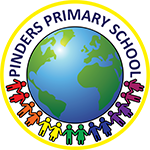EYFS
In EYFS, planning is unique to the children and incorporates their interests and next steps in their development. Children in EYFS encounter religions and worldviews through special people, books, times, places and objects and by visiting places of worship. They listen to and talk about stories. Children are introduced to subject specific words like bible and mosque and use all their senses to explore beliefs, practices and forms of expression. We encourage children to ask questions and reflect on their own feelings and experiences. They use their imagination and curiosity to develop their appreciation of and wonder at the world in which they live.
Along side our themed based curriculum we use the Wakefield Agreed Syllabus to support our breadth and depth of the teaching of RE at Pinders.
Some of our teaching and learning may cover the following aspects of the Wakefield Agreed Syllabus.
Key Questions: Which stories are special and why? (Taken from the Wakefield Agreed Syllabus)
Pupils should be able to:
- talk about some religious stories
- recognise some religious words, e.g. about God
- identify some of their own feelings in the stories they hear
- identify a sacred text e.g. Bible, Qur’an
- talk about what Jesus teaches about saying ‘thank you’, and why it is good to thank and be thanked
Key Question: Which people are special and why?
Pupils should be able to:
- talk about people who are special to them
- say what makes their family and friends special to them
- identify some of the qualities of a good friend
- reflect on the question ‘Am I a good friend?
- recall stories about special people in other religions and talk about what we can learn from
Key Question: Which places are special and why?
Pupils should be able to:
- talk about somewhere that is special to themselves, saying why
- be aware that some religious people have places which have special meaning for them
- talk about the things that are special and valued in a place of worship
- identify some significant features of sacred places
- recognise a place of worship
- get to know and use appropriate words to talk about their thoughts and feelings when visiting a church.
Key Question: Which times are special and why?
Pupils should be able to:
- give examples of special occasions and suggest features of a good celebration
- recall simple stories connected with Christmas/ Easter and a festival from another faith
- say why Christmas/Easter and a festival from another faith is a special time for Christians/ members of the other faith.
Key question: Where do we belong?
Pupils should be able to:
- re-tell religious stories making connections with personal experiences
- share and record occasions when things have happened in their lives that made them feel special
Key Question: What is special about our world?
Pupils should be able to:
- talk about things they find interesting, puzzling or wonderful and also about their own experiences and feelings about the world
- re-tell stories, talking about what they say about the world, God, human beings
- think about the wonders of the natural world, expressing ideas and feelings
- express ideas about how to look after animals and plants
- talk about what people do to mess up the world and what they do to look after it.
